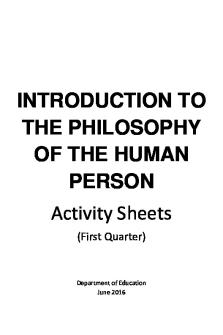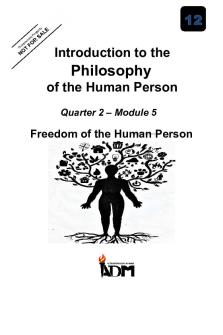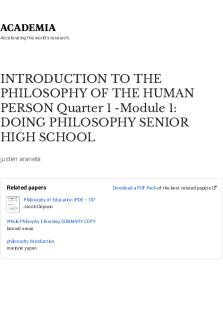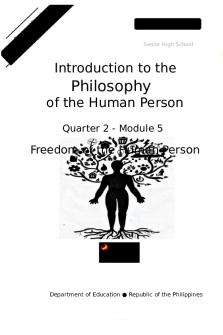Reviewer in the Introduction to Philosophy of the Human Person PDF

| Title | Reviewer in the Introduction to Philosophy of the Human Person |
|---|---|
| Author | Byun Macabutas |
| Course | Philosophy |
| Institution | Ateneo de Zamboanga University |
| Pages | 4 |
| File Size | 141.7 KB |
| File Type | |
| Total Downloads | 269 |
| Total Views | 593 |
Summary
PHILOSOPHY REVIEWERChapter I – Nature of PhilosophyLesson 1 – What Philosophy MeansSome Common meanings of Philo: -Philosophy as a set of beliefs -Philosophy as an activity of reasoning -Philosophy as an academic subject/coursePhilosophy came from the Greek word: Philosophia, which means Love of Wis...
Description
PHILOSOPHY REVIEWER Chapter I – Nature of Philosophy Lesson 1 – What Philosophy Means Some Common meanings of Philo: -Philosophy as a set of beliefs -Philosophy as an activity of reasoning -Philosophy as an academic subject/course Philosophy came from the Greek word: Philosophia, which means Love of Wisdom Philo – Love and Sophia - Wisdom Therefore, Philosophers are lovers of wisdom. 3 key Philosophers to remember: Socrates, Pythagoras, and Plato. Philosopher, first used by Pythagoras. Pythagoras was popularly known for his mathematical formula, Pythagorean Theorem. Sophists – were a group of intellectuals that taught oratory for a fee to indiv. That desired a good career in Politics. Sophists believe that all truths are Relative in that all truths are determined by or based on human interests. Philosophers oppose of the sophists’ belief, and stated that truth is Universal and are objective. 5 Traits of a Wise Person: A wise person is aware of his own ignorance A wise person has justified true beliefs A wise person knows what things are valuable in life. A wise person knows what to do and does it. A wiser person has the ability to put knowledge into practice. Rodolf Carnap – distinction between internal and external questions.
Philosophy as an Activity Ludwig Wittgenstein – “Philosophy is not a body of doctrine but an activity”
Philosophy as an Activity is Dynamic Critical Creative
Lesson 2 – Kinds of Philosophy 5 General Types of Philosophy
Thematic – topic of the issues being addressed. Positional - Solution that is being proposed. Methodological – Method use to resolve issues. Regional – according to geographical location. Historical – When or the Historical period.
Branches of Philosophy under Thematic type: Logic - From the Greek “logos” which has a variety of meanings including word, thought, idea, argument, account, reason or principle is the study of reasoning, or the study of the principles and criteria of valid inference and demonstration. - Right way of thinking - Has Formal, Informal, Symbolic, and Mathematical logic. - Aristotle – “is new and necessary” -
Epistemology Greek word episteme meaning “knowledge. The nature of Scope and Knowledge Is the study of the nature and scope of knowledge and justified belief. Analyzes nature of knowledge
Metaphysics -
Traditional branch of philosophy concerned with explaining the fundamental nature of being and the world that encompasses it. - Derived from the word “Meta” – beyond, upon, after - First used as title in Aristotle’s work - Ultimately, what is there? And what is it like? Keep in mind:
-
Metaphysical Cosmology Necessity and Probability Determinism and Free will Being and Ontology Religion and Spirituality
-
Ethics
-
-
From the word “ethos” meaning custom or habit. Branch of study dealing with what is the proper course of action for man. It is also the study of right or wrong. Study of what is right and wrong What should you do? Moral Principle – principles of right and wrong that are accepted by an individual or group. Moral Judgement – Comment that is based upon a set of morals or a value.
Philosophy of Religion -
-
-
Philosophy of Mind -
Aesthetics -
-
From the word Aesthetikos, derived from Aesthenomia which means I perceive feel, sense) Theory of Beauty Beauty is Objective and Universal – Emmanuel Kant
Social and Political Philosophy -
-
Social Philosophy – study about the social behaviour and social institutions in terms of ethical values. Political Philosophy – Study of gov’t and its laws and its enforcements Relationship of government with the people Political economy, demands of justice, rules of truth and evidence.
-
-
Philosophy of Science - Concerned with the foundations, methods and implications.
-
Akiomatic assumptions - established, accepted and self-evidence truth.
-
Coherentism – restricts true sentences to those that cohere with some specified facts
-
Anything Goes – Only principle that does not inhibit progress.
The philosophical examination of the central themes and concepts involved in religious traditions 3 considerations The existence of God Nature of God Knowledge of God Logical Positivism – developed by the Vienna Circle Realism and Non-realism Religious diversity: Religious Pluralism – diversity of religious beliefs Religious Relativism – belief that there is no absolute truth Religious Exclusivism – belief that there is one particular religion.
-
Studies: Nature of the mind Mental events Mental functions Mental properties Consciousness Their relationship to the physical body, particularly the brain. How to explain how a NON-MATERIAL MIND can influence a MATERIAL BODY Monism and Dualism Monism - Position that the mind and body are not ontologically distinct kinds of entities. THREE MAIN MONIST SCHOOLS OF THOUGHT: 1. Physicalism - Mind is purely physically construct. 2. Idealism - Mind is all that exists and that the external world is an illusion 3. Neutral Monism - existence consists of one of a kind primal sustance.
Dualism - Position that the mind and body are in some categorical way separate from each other, and that mental phenomena are non-physical in nature. THREE MAIN DUALIST SCHOOLS OF THOUGHT: 1. Substance Dualism- mind is an independently existing substance.
2. Property Dualism- Mind is a group of independent properties. 3. Predicate Dualism- Psychological experiences we go through cannot be redescribed in terms of physical predicates of natural languages.
-
Philosophy of Language -
-
-
-
-
-
-
Focuses with four central problems: The Nature of Meaning Language Use Language Condition The relationship between language and reality Came from India 1500 B.C Two types of linguistic meaning (according to Geoffrey Leech) 1. Conceptual- It has something to do with the definition of the words. 2. Associative- It has something to do with the individual mental understanding of the speaker. IDEA THEORIES OF MEANING Claim that meanings are purely mental contents provoked by signs. TRUTH-CONDITIONAL THEORIES (CAME FROM FREGE) Define meaning to be the conditions under which an expression may be true or false. REFERENCE THEORIES OF MEANING OR SEMANTIC EXTERNALISM View meaning to be equivalent to those things in the world that are actually connected to signs. VERIFICATIONIST THEORIES OF MEANING The meaning of a sentence is its method of verification or falsification.
PRAGMATIST THEORY OF MEANING Meaning is determined by the consequences of its application.
Lesson 3 – Importance of Philosophy 2 reasons - Bertrand Russel – Philosophy as a futile activity: 1. Indefiniteness of Philosophy Philosophy does not give final answers to the questions it deals with. 2. Impracticality of Philosophy
Lesson 4 – Nature of Truth Bearers of truth – Beliefs and Beliefs Empirical Truth – Established by means of sense experience. Posteriori Truth. Rational Truth – Established by reason. Priori truth. Synthetic Truth – Extends our knowledge. Analytic Truth – does not extend our knowledge. Contingent Truth – True only in some situations. Necessary Truth – True in all possible situations. Private Truth – True to the person who has the belief or makes the statement. Public Truth – Can be known, in principle, by everyone Objective Truth – Based on factual judgements. Opposite of subjective. Subjective – Depends on attitudes, preference, or interests of a person or group. Value. Universal Truth – Acknowledged to be true by everyone. Relative Truth – Acknowledged to be true only by some people. Certain Truth – Arrived through deductive reasoning. (In science it is like the conclusion) Probable Truth – Arrived through inductive reasoning. (In science it is like the Hypothesis) Disciplinal Kinds of truth: - Religious - Scientific - Psychological - Biological - Economic
Knowledge is justified true belief. Lesson 5 – The Truth and Knowledge The General methods of truth 1. Correspondence – Corresponds to facts. 2. Coherence – Coheres to rules of a system. 3. Pragmatism – Result in beneficial consequences. The Particular methods of truth: 1. Observation – (perception) method to check empirical statements: statements about an observable fact in the world. - Internal observation – is observation of our own thoughts and feelings. Introspection - External observation – observation of things “outside our mind or consciousness”, physical objects using our 5 organ senses. 2. Reasoning – Process of establishing truth by means of reason. Can be done by testing the coherence of 2 statements: whether the 2 statements are contradictory or cannot be held true at the same time. - Includes Inference that can be done deductively or inductively. 3. Intuition – It is the way by which we directly grasp the truth of something: We immediately know that something is true without going through the process of observation and reasoning. 4. Mystical Experience – Usually “Spiritual” and “religious” such as the experience of our union with God. By way of religious truths are known. 5. Appeal to Authority – takes form of a testimony of a reliable eyewitness, or info from an appropriate expert. Conditions of Knowledge Know (by acquaintance) – Familiarity of the place/person Know (by propositional knowledge) – Knowledge of Skill Know (by proposition) – knowledge of something that could be either true or false
Three conditions for knowledge to occur 1. We believe _x_ to be true. (Belief) 2. x is indeed true. (truth) 3. We are justified in believing that x to be true. (justification) The condition of justification is what distinguishes knowledge from opinion, and also from a guess. In an opinion, a person claims to know a certain event with little or insufficient evidence. And with a guess, a person claims to know something with no evidence at all. General Classifications of Disagreements:
-
Disagreement in Belief: are disagreements about facts. Resolved by verifying the facts at issue. Verification can be done through: directly observing, examining relevant documents, and/or appealing to appropriate authorities. Disagreement in Attitude: are disagreements over preferences. Are resolved by persuasion, if not compromise. Persuasion can be done either logically or illogically (informal fallacy). Verbal Disagreements: are disagreements that arise out of misunderstanding of the meanings of our linguistic expressions. These are resolvable by clarification of the real meanings of those misunderstood linguistic expressions....
Similar Free PDFs

The Human Person in Society
- 12 Pages

Introduction to the Human Body
- 9 Pages

Trespass to the person Notes
- 6 Pages
Popular Institutions
- Tinajero National High School - Annex
- Politeknik Caltex Riau
- Yokohama City University
- SGT University
- University of Al-Qadisiyah
- Divine Word College of Vigan
- Techniek College Rotterdam
- Universidade de Santiago
- Universiti Teknologi MARA Cawangan Johor Kampus Pasir Gudang
- Poltekkes Kemenkes Yogyakarta
- Baguio City National High School
- Colegio san marcos
- preparatoria uno
- Centro de Bachillerato Tecnológico Industrial y de Servicios No. 107
- Dalian Maritime University
- Quang Trung Secondary School
- Colegio Tecnológico en Informática
- Corporación Regional de Educación Superior
- Grupo CEDVA
- Dar Al Uloom University
- Centro de Estudios Preuniversitarios de la Universidad Nacional de Ingeniería
- 上智大学
- Aakash International School, Nuna Majara
- San Felipe Neri Catholic School
- Kang Chiao International School - New Taipei City
- Misamis Occidental National High School
- Institución Educativa Escuela Normal Juan Ladrilleros
- Kolehiyo ng Pantukan
- Batanes State College
- Instituto Continental
- Sekolah Menengah Kejuruan Kesehatan Kaltara (Tarakan)
- Colegio de La Inmaculada Concepcion - Cebu












